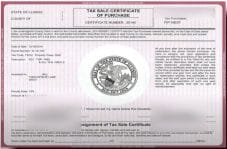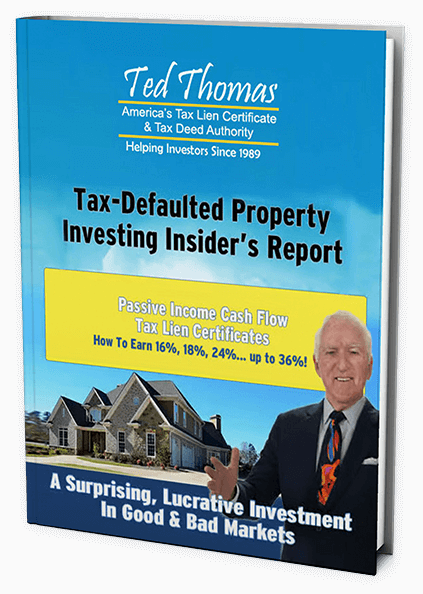Key Takeaways
- Real Estate Tax Lien Investing is essentially paying the property tax debt of someone else to earn interest on the tax amount as the homeowner works to pay back the debt.
- Tax lien investing can give you an attractive rate of return of up to 24%, and is a safe and stable investment option.
- In some cases, you may have a chance to acquire the property if the homeowner fails to pay back the property tax debt with interest.
- To acquire a tax lien certificate and earn interest, you will need to register for the auction.
- You can bid online or in person. Make sure to check your local county’s website.

What is a Real Estate Tax Lien?
A tax lien is essentially the government’s legal claim against a property when homeowners fails to pay their property taxes. This lien prevents the transfer or refinancing of the property until the outstanding property taxes are paid. This may also lead to you acquiring properties at highly discounted prices with no mortgage.
Tax Liens as an Investment Avenue
Investing in real estate tax liens can be a strategic move to enhance and diversify your portfolio. Investors can bid on tax lien certificates at auctions, acquiring the right to collect the unpaid property taxes plus interest. The cost of these investments varies, fitting any budget, and generally increasing with the property’s value.
- High Potential Returns: The tax lien certificate holder can earn returns through interest payments (up to 24%), paid by the property owner. Interest rates differ by state, so take a look at Ted Thomas’ Essential List of Tax Lien Certificate States for the complete details on each tax lien state.
- Foreclosure Possibility: In some instances, if the delinquent taxes remain unpaid, you, as the investor, might have the opportunity to initiate foreclosure proceedings and potentially take possession of the property at a significant discount with no mortgage.
If you want to explore this investment option further:
Tax Liens and the Ever-Growing Real Estate Values
In recent years, real estate has witnessed a notable surge in value. Take, for example, King County, Washington. According to the kingcounty.gov website, the market value of properties escalated by more than 9%, a $190 million increase, between 2021 and 2022. This increase pushed the property tax assessment up to $6.79 billion in 2022, a big jump compared to the previous year. Similarly, the Federal Housing Finance Agency (FHFA) reports that house prices soared in 49 states from the third quarter of 2022 to the third quarter of 2023, with Vermont, Maine, New Hampshire, Connecticut, and New Jersey seeing the highest jumps, highlighting a nationwide trend of real estate appreciation.
These rising values are pivotal for local governments as more expensive real estate translates to increased property taxes. As property values go up, more people may find it hard to pay their property taxes, leading to more unpaid taxes for the government. To recover these taxes, the local county puts a tax lien on these properties. These tax liens are then auctioned off to investors, giving them a chance to earn back the unpaid property taxes, plus some extra money from interest.
Currently, the National Tax Lien Association (NTLA) estimates around $21 billion in property taxes going unpaid annually, and between $4 billion and $6 billion worth of these being auctioned off, it’s highly likely that these numbers will only increase as real estate prices continue to climb.
This increasing trend in property values highlights the growing opportunities in tax lien investing. Next up, let’s break down how you can jump into tax lien investing step by step.
How Does Real Estate Tax Lien Investing Work?
Real estate tax lien investing allows you to buy the right to collect unpaid property taxes from delinquent owners, potentially earning a high return on your investment. Curious about how real estate tax lien investing works? Here’s a breakdown of the process:
1. Homeowner Fails to Pay their Property Taxes
As mentioned earlier, in an effort to collect unpaid property taxes, the local government will issue a legal claim against the property, known as a tax lien. This claim signifies the unpaid tax amount, along with any additional interest or penalties the homeowner is required to settle.
2. Tax Lien Certificates are Generated
From the tax lien, the local government then generates a tax lien certificate. This certificate represents the unpaid property tax and contains information about the delinquent property such as the amount of tax owed and interest. Investors are effectively buying the right to collect the tax themselves, plus interest of course.
3. Tax Lien Certificates are Auctioned to Recover Unpaid Property Taxes
Local counties hold auctions where investors can purchase tax lien certificates. The dates for these auctions vary by state. For example, Alabama hold tax lien auctions from April to June, while Iowa hold theirs on the 3rd Monday of June.
Also, each state has its own set of rules. In Missouri, non-residents are not allowed to bid on these auctions, with some exemptions. At the same time, many states like Florida allow foreign bidders as long as you submit the required documents.
4. Investors Like You Bid on the Tax Lien Certificates
As an investor, you can participate in these auctions and choose which tax lien certificates you would like to bid on. Your bids may focus on the amount you’re willing to pay or the interest rate you’re willing to accept.
Note: Don’t overbid – outbidding your competition will lead to lower profit margins.
5. Winning the Auction and Your Rights
If your bid is successful, you will pay the tax debt and, in turn, receive the right to collect that debt plus interest from the homeowner. However, this does not grant you ownership of the property, but rather financial security until the owner repays their tax debt.
6. Property Owner’s Redemption Period
The homeowner has a specified redemption period to settle their debt with the investor. Within this time frame, they must pay back the owed amount including the interest as per the terms of the auction. Similar to auction dates, the redemption period varies from state to state starting at 6 months in Massachusetts.
7. You Get Paid or You Start the Foreclosure Process
The final outcome depends on the homeowner’s actions. If they pay the property tax debt with interest, you recover your investment plus earnings. But if they do not pay within the redemption period, you may have the option to begin the foreclosure process to secure your investment, depending on local laws and the stipulated time frame.
Note: It is more common for homeowners to settle their outstanding taxes during the redemption period than for properties to go through foreclosure.
Why Invest in Tax Liens: Benefits & Advantages
Tax lien investing can be a compelling option for investors seeking high returns and a secured position. Let’s explore the benefits that make it so attractive:
Generous Returns of Up to 24%
Investing in tax liens can yield returns as high as 24%. States like Florida offer interest rates up to 18%, while Iowa may see returns up to 24%. These interests are predetermined, offering stability against market volatility.
Passive Income
Tax lien investments can generate income without active involvement. It’s a hands-off approach that can bolster your earnings, functioning effectively as a source of passive income.
Low Barriers to Entry
- Minimal Initial Investment: You can dip your toes in with a small amount, testing the waters before diving deep.
- Accessible to Many: It levels the playing field, enabling more people to participate in real estate investments.
- Flexibility in Investment Size: You decide how much to invest, scaling up or down based on your comfort level and budget.
- Diverse Entry Points: With options across 28 states, you’ve got a wide range of choices to start small and gradually expand your portfolio.
Steady and Low Risk
Secured by the underlying property and governed by property tax laws, tax liens are considered low-risk. Your investment rests on a solid foundation with a 200 year history of reliability.
Diverse Selection: Something for Everyone
The variety of tax lien certificates available means there’s an investment to match different strategies, risk profiles, locations, and budgets, offering something that appeals to every investor.
Returns are in Cash and Easy to Reinvest
The resolution of tax liens results in cash that includes both the principal and earned interest. This sum can readily fund your next investments, enabling a continuous investment cycle.
How To Invest in Tax Lien for Beginners: Step-by-Step
Intrigued by the potential of tax lien investing? Here’s a roadmap for beginners to navigate the process:
1. Choose Your Preferred Tax Lien State
The three most important factors when buying a home are location, location, and location. The same applies to tax lien investing. Start your investment journey by identifying states that permit the sale of tax lien certificates. You will also need to take into account the following:
- Interest Rates Offered
- Redemption Period
- Rules and Regulations
Of course, we have compiled these data to make this process easier for aspiring investors like you. Check out our Essential List of Tax Lien Certificate States to save time and find the best states for investing.
2. Finding Auction Dates in Your Chosen State
Once a state is chosen, determine when tax lien certificate auctions are held. These dates are critical as they represent your opportunity to purchase tax liens. Often, auction schedules are available on the local county newspaper or websites.
3. Register for the Tax Lien Certificate Auction

Register for the auction in advance, as most authorities require investors to register as bidders. This step usually involves providing personal information and, in some cases, depositing funds or pre-registering bids. Check local county websites and ensure that you understand and meet all the requirements to participate in the auction.
4. Check the Local County Website for the Tax Lien Certificate List
Counties are required by law to advertise the details of the tax lien certificates a month before the auction starts in an attempt to notify the delinquent homeowners. Use this to conduct your initial due diligence in preparation for the auction.
5. Due Diligence on Potential Investment Properties
It is important to investigate the properties associated with the tax liens you’re interested in. This research is crucial to understanding the property’s value and potential issues. Examine the property condition and market value. After all, nobody would pay the property taxes on a house that’s burned down.
6. Set a Maximum Bid and Stick to it
At the tax lien certificate auction, place your bid strategically. Your objective is to secure a high return on invested capital without overpaying. Winning the bid gives you rights to the certificate, which can earn interest over time or potentially lead to property ownership.
7. Collect the Tax Payment or Start the Foreclosure Process
After successfully bidding on a property, you must act to collect payment or initiate the property foreclosure process, should the property tax debt remain unpaid. Check out our blog about tax lien foreclosure to learn more about this process.
8. Rinse and Repeat
As mentioned earlier, you get your returns in through checks or deposited directly into your bank account, which makes it easy to reinvest. As you gain experience and success, you’ll find and perfect the investment strategy that fits you best.
Steps | Summary |
1. State Selection | Choose a tax lien-permitting state. |
2. Auction Timing | Discover upcoming auction dates. |
3. Auction Registration | Complete the necessary registration. |
4. Tax Lien Identification | Use local resources to find properties. |
5. Due Diligence | Conduct property evaluations. |
6. Auction Participation | Engage in the bidding process. |
7. Post-Auction Actions | Collect dues or initiate foreclosure. |
8. Investment Continuation | Apply knowledge to future auctions. |
Keep the due diligence process thorough, the bidding strategic, and the post-auction management meticulous, and you’ll be well on your way to reaping the benefits of tax lien investing. You can even look into investing in tax liens in other states to further spread your portfolio.
COMMON MISTAKES
In closing, I want to give you a heads up on the big mistakes that tax lien certificate and tax defaulted property investors make at auctions.
Big Mistake #1
They don’t look at property. This opens them up to big time problems. For example, what if a hurricane blew the property away, a flood washed it away, or a fire burned it to the ground?
Big Mistake #2
Most investors are extremely excited and very eager to be successful. Unfortunately, they bid on properties and have no exit strategy.
FAQs About Real Estate Tax Lien Investing
Where Can I Find the Tax Lien Properties List?
- County Websites or Treasurer’s Offices
- Local Newspapers
- Online Auction Platforms
How do I Find Tax Lien Properties for Free?
- County Websites or Treasurer’s Offices
- Local Newspapers
- Online Auction Platforms
What Happens to a Mortgage in a Tax Lien Sale?
The tax lien takes precedence over existing mortgages, putting the lender’s investment at risk. The homeowner must pay off the tax lien to secure their property. If unresolved, the tax lien holder may foreclose, potentially wiping out the mortgage.
What Type of Lien is a Real Estate Tax Lien
An involuntary lien. Tax liens take precedence over other liens against the property.
Are IRS Tax Liens Public Record?
Yes, IRS tax liens are indeed public records, guaranteeing anyone is aware of the unpaid federal taxes against a property.
Invest Faster, Smarter, and Better with Ted Thomas
Ted Thomas boasts an impressive reputation as a tax lien investor from Florida. His offerings are diverse, with a range of over 30 published books that have reached a global readership, demonstrating their extensive influence and effectiveness.
Ted Thomas has stepped into the role of a key figure for those seeking financial education, especially appealing to individuals looking to secure their financial future. His inspiration to guide others financially stems from a personal history of seeing his own family struggle, which drove him to unveil practical wealth-building strategies for both retirees and the younger generation.
If you’d like to know more about tax-defaulted real estate investing, Ted Thomas provides full support and complete training with home study courses, Q&A webinars, live tutorials, workshops, virtual classes, personal coaching with certified coaches, and an interactive map and auction calendar research tool that allows you to visit each county online to find the details about upcoming auctions.
Start your money-making journey by attending Ted’s 7-Hour foundational training. Book your seat today to attend the Retire Rich From Home Virtual Workshop.
Want to earn massive income from bargain real estate investing? Would you like to buy mortgage-free properties for pennies on the dollar? Or earn double-digit interest rates secured by real estate? Then get started today by clicking the button below and get your FREE Insiders Report.




